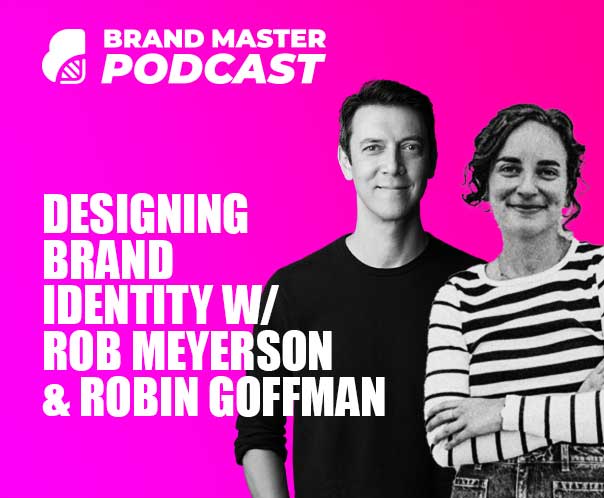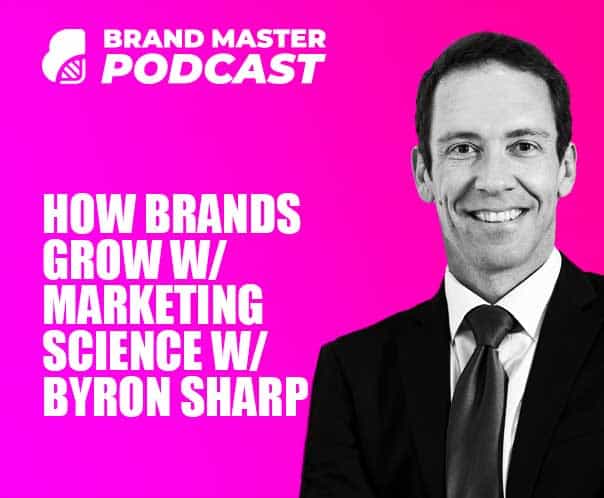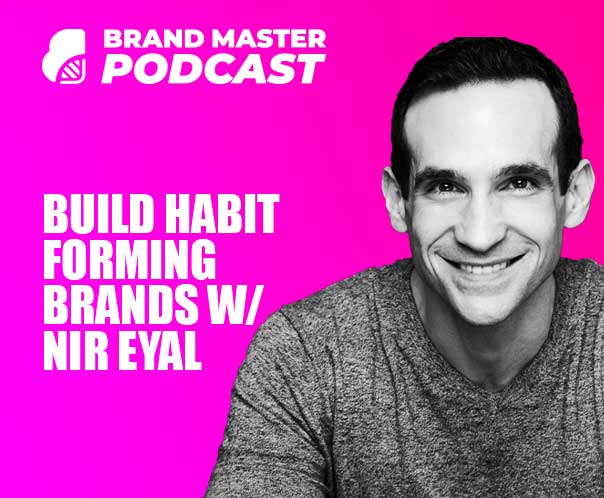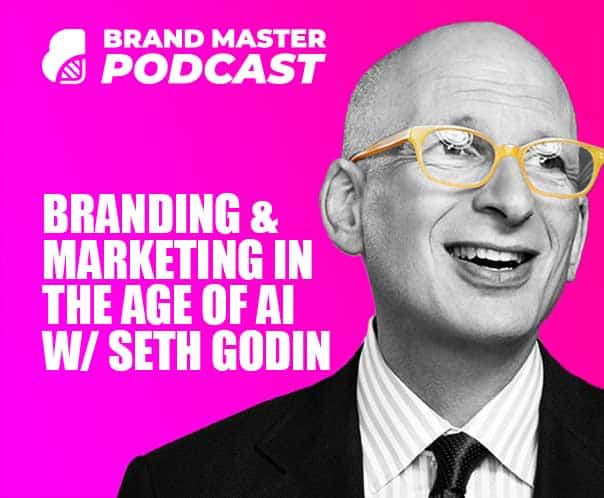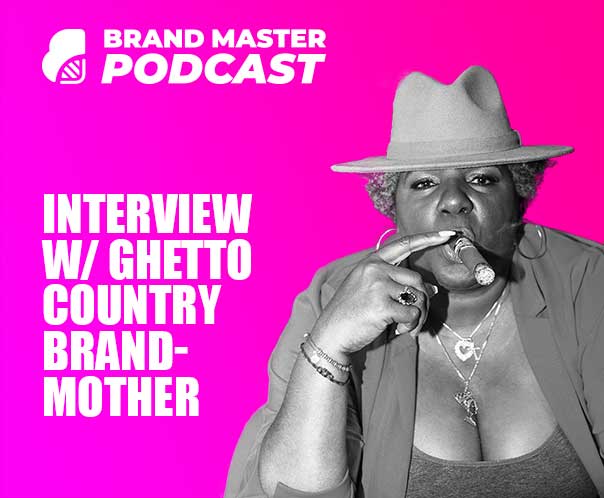In this episode of The Brand Master Podcast, I’m speaking with SEO and customer research pioneer, Mr. Rand Fishkin.
Now, for those of you who don’t know him, Rand Fishkin is the founder and former CEO of Moz, a hugely popular SEO software. He’s also the founder and current CEO of Sparktoro, a groundbreaking customer research software used by 1400 agencies and teams.
Rand is also the author of the Amazon five-star rated book, Lost and Founder: A Painfully Honest Field Guide To The Startup World.
Rand shares his high-level tech and marketing insights on
How to fuse modern and traditional forms of customer research.
How to dig deeper beyond demographics and psychographics to find nuggets of gold
How to reverse engineer the problem. Build a more effective and practical buyer persona
Rand also lifts the hood and takes us for a spin on his customer research software Sparktoro, shown us how thousands of brand strategists and agencies use it for their clients.
So if you want to learn how to enhance your customer research processes to find unique insights and opportunities you can use to build brands from a top marketing and software pioneer, then stick around for this article
How To Do Market Research (Audience Intelligence w/ Rand Fishkin)
One-click subscribe for video updates
Rand Fishkin (From Moz To Sparktoro)

Stephen Houraghan
Can you give us a bit of a background as to that journey from creating Moz and to then creating Sparktoro an audience research tool.
Give us a bit of background as to that journey and why you ended up creating such a tool.

Rand Fishkin
Sure, I started Moz back in 2003, to its been around for a while. Initially, as a consulting firm and then got into software, obviously it was in the SEO software space.
I kept encountering this challenge where SEO couldn’t solve their problems.
Ranking in the Google search engine was not good enough to solve their marketing problems.
A lot of the time that is because the product that they offer didn’t have existing demand through search.
So they had to create that demand and search are terrible at going out and creating demand for you.
Simultaneously I was working with some really smart agency folks actually, and saw this interesting application of a technical and creative process that I thought was just genius.
These agencies would get lists of their client’s email addresses and customer databases and they would take that and they’d run a giant overlap.
So of the 20,000 people on your email list, we found 2,500 who had social media addresses that we could match up and we went and crawled all of those.
Of that 16% subscribed to this YouTube channel that’s where we’re gonna do our marketing.
That’s where we’re gonna run our YouTube ads and that’s who’s channel that we’re gonna try and get you on as a host or presenter or, as a guest of that kind of thing.
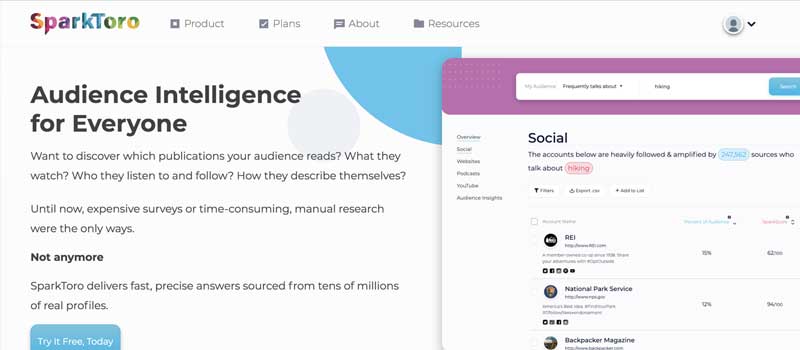
You would do this across advertising, you do it across PR, pitches, I thought this was genius, absolutely genius.
I also thought that it was God damn insane that they’re paying $150,000 and building their own private crawlers and doing all this identity resolution.
I thought why can’t we just do that for the whole internet?
So that’s how we built Sparktoro.
We basically said, okay, that is incredibly smart, being able to identify the public social profiles of your audience,
“What a gift, that data is invaluable to every kind of marketing”
Let’s go do it for the whole web.
What we’ve done so far is really just the English language web but it’s already become pretty invaluable for a lot of marketers.
The Importance Of Customer Research & Audience Intelligence

Stephen Houraghan
I love the way you kind of give insights as to the amount of groundwork being done in the background, just to get this kind of customer research.
It has been up until this point for depending on what exactly you’re searching for quite a tedious job, but obviously, it’s worth the effort to go to that, those kinds of lengths to find that information.
Can you give us your insight as to why detailed customer research or audience research is so important for brands?

Rand Fishkin
I don’t think that I’m not sure it’s a today thing, I think this has always been extremely important in whatever in 1965 if you walked into Ogilvy and Mather and you said,
Hey, I wanna run a giant ad campaign across the US, I’m Coca-Cola
A lot of what they do would say,
What are the demographics and psychographics that we’re trying to reach?
What’s the brand impression that we want?
Where do we need to go to do that?
And all right,
We’re gonna have this much that we spend on print
We’re gonna have this much that we spend on television
We’re gonna do this radio
We’re gonna do billboard advertising
We’re gonna do in-store displays
We’re gonna do some guerilla marketing
We’re gonna do some events
All the sort of offline thing because of course there was no internet. Then the whole idea of any sort of marketing or advertising.

Let’s go tell the story that we need to tell the one that’s gonna persuade our customers, get them to be aware of our brand, and resonate with them.
Get them to know us and like us and trust us and then we better go tell that message in places that we know they pay attention.
Audience research has always been about what are the places where this audience pays attention?
The Nielsen ratings in the 1970s and 80s was all about, who watches, what TV show, when, on what channel and so that you’d run TV advertising.
The beautiful thing about the web is it got way more granular. A lot of this data used to be, you could go to the sources and find it directly.
Now you really need to do something like this process to figure it out, right?
If you go and get many thousands of public accounts and you go visit those accounts, you can see what they do and how they behave and how they describe themselves and demographic data.
PRO Brand Strategy BluePrint
Build Brands Like A Pro Brand Strategist
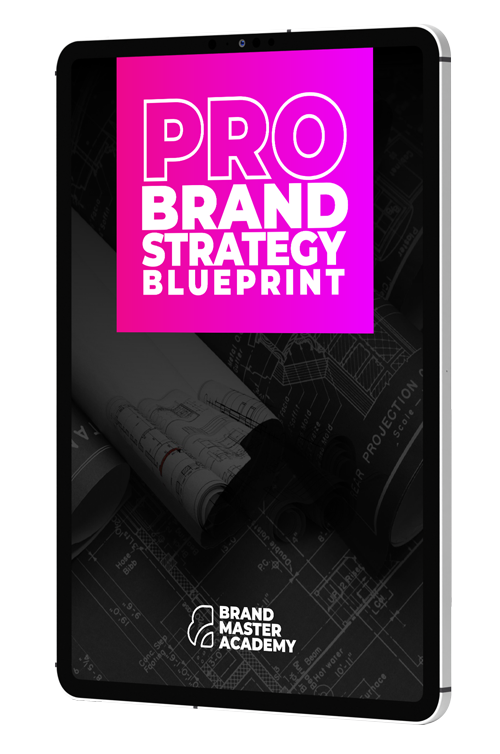
Traditional vs Modern Market Research

Stephen Houraghan
The tools today is really what’s changing, how the information that we can get.
Sparktoro is a perfect example of that. I don’t think the fundamentals change too much.
Based on that, what is it that you really like about the traditional methods of market research and what is it that you felt probably wasn’t as helpful as it could have been?

Rand Fishkin
I think that every product, person, entrepreneur and creator should be doing some form of surveys and interviews.
Those are the right surveys and interviews being the traditional market research path.
I have no problem with them.
I think they’re very good, but I don’t think even the most fervent proponent of survey methodology, market research surveys would tell you.
Oh, well, yeah, you can just ask people what podcasts they listen to and they’ll tell you.
You can just ask them what YouTube channels they subscribe to, they’ll tell you and ask them what websites they visit. You can ask them who they follow on Instagram.
You’ll get at best possibly do is maybe ask people for three or four relevant sources that they follow. If you asked a hundred interior designers,
Hey, you know, tell me about the sources that you follow.
You might be able to find some overlap and look across those and maybe get a list of 10 or 20 that your a hundred people mentioned that were mentioned by more than two people.
Then you could sort of guesstimate these are probably the top three or four but what percent of interior designers overall listen to them?
You don’t know whether you’ve got a buy, a sample set, right?
From your survey, you’re gonna be talking to probably interior designers that are already in your network or on your social list or on your email list or in your geography and networks are always biased.
Surveys are great for a lot of things, and Interviews are great for a lot of things, but this is something they are terrible at.
They cannot tell you where you can reliably do your marketing to reach a group of people that you don’t already reach.
Explore Brand Strategy
Programs & Tools
How To Find Insights From Demographics & Psychographics

Stephen Houraghan
That’s the beauty of hitting the internet because the behaviors are out there and it gives us scale and the quantitative information that you just can’t compete with those surveys and that’s really where you get that mass information.
You can find those nuggets of gold, where clusters of your audience are gathering and your competitors might not be aware of this information.
That’s the beauty of it today, it’s all at our fingertips. I mean the job that business owners had to do years ago to find that information, it just wasn’t available to them.
So it’s great that small businesses have this information as well and the demographics and psychographics side of things because again, let’s go back to the traditional way of doing things.
We’ve always looked at demographics and psychographic. Do you still feel that that’s, that’s really beneficial and what kind of useful insights can we pull from those two?

Rand Fishkin
It depends who you are. Right?
For a lot of mass-market consumer brands, people who are doing big brand ad campaigns, some of that demographic stuff is useful to them.
Sparktoro actually, we are a little funny in this regard. So for primarily ethical reasons we provide some demographics, but it’s very basic.
So for example like age, gender, education, interests and geography which I guess is psychographics but we do not do things like race, sexuality, or religion and political affiliations that kind of stuff.
Because we believe those are ripe for abuse and there would be a lot of bad actors who would take advantage of that and use it in ways that, even if it would bring us lots of subscriptions and make us money we’re we have no interest in contributing to that and never will.

Stephen Houraghan
So you guys have the opposite approach to Zuckerberg.
The whole Facebook empire and all of that massive data that they have, which is great, because look at the end of the day I think that we are marketers, but we get it because we’re part of the big machine as well.

Rand Fishkin
Well, I don’t think that a lot of folks like Mark Zuckerberg believe that the goal of life is to maximize capitalist revenue and growth from a business engine.
Frankly, I think of it the opposite way which is that small-scale capitalism is designed to enable people like us to build interesting businesses that hopefully are fun for us to run and let us work with people that we love and have clients that we like and do the things that we wanna do in the world.
To be Frank, I really wish that I think that it’s actually the job of the government to step in and help people like Zuckerberg or Google or Microsoft or Apple or Amazon to sort of act a little bit more like a small business instead of a monogamy
Stephen Houraghan
To help the likes of Zuckerberg, have those ethical values that obviously Sparktoro are adopting without that governmental pressure.

Rand Fishkin
Yeah and I think that unfettered capitalism, UN unregulated capitalism works terribly like absolutely terribly as bad as any other system you could name out there.
But well-regulated small-scale capitalism businesses competing with each other. You get from competition comes lots of beautiful things.
This is actually a big part of star sparktoro’s ethos, we are trying to say, don’t just throw all your money at Google and Facebook and Amazon, all your advertising dollars.
Go find the place, the sources of influence yourself and go directly pay those creators and, publications and, do your advertising direct to them.
You don’t need to put your money in big tech monopoly basket, and frankly, you can get better results because of it.
They’re, they’re just a middleman.
Modern Methods Of Audience Research

Stephen Houraghan
Going beyond demographics and psychographics because look we try to paint a picture of who our audience is.
We look at the circumstances of their lives through their demographics and the behaviors of their lives through psychographics.
But really when it comes to making those connections with our audience, we wanna go deeper than that. We wanna get down to the nitty gritty, those challenges, those emotions that they go through.
How can we drill down past the demographics and psychographics with modern techniques?

Rand Fishkin
Actually, I think this is where you refer to classic techniques. This is something that surveys and interviews have been doing well for a hundred years.
I would urge people to keep using them as tools to figure out the emotions behind how people understand.
I think one of the best things that you can possibly do as a marketer is do just what product people do and that is talk to your customers.
Talk to your potential customers, talk to your customers as sources of influence, talk to people who don’t even know about your brand.
Ask them why they make decisions, why they choose certain things, and what resonates with them.
Have friendly conversations that just expose their existence in your universe, right around your topic areas.
You will start to gain empathy for like, oh yeah, gosh, you know, a lot of interior designers really struggle with the relationship with the builder and none of my competitors are talking about they’re that they’re not thinking about builder-friendly materials.

They’re not thinking about building relationships. They’re just trying to please what they think are the interior designers, customers, which is the end client the homeowner.
Yep. Gosh, is there an opportunity for us there? Could we do something that would really let that message sink in? Unlike the rest of your providers?
We do this thing that serves this need, that our competitors didn’t know you had.
I think that that’s the kind of emotional and psychographic information that is. Impossible to get from whatever large-scale data sources, like a Sparktoro.
I think, the one thing I might look at is I might look at things like the words and phrases that people use in their posts and shares.
I might look at pages that are resonating sort of this is a trending piece in the industry there, that must have hit home with a lot of folks in our field, that sort of thing, but really surveys and interviews, man.
How To Create More Effective Buyer Persona

Stephen Houraghan
I love that as well because you know, it really pulls back into focus the idea that the quality of the answers that you get is in direct correlation to the quality of the questions that you ask.
If you’re asking really good questions, then you can get some insights that your competitors just can’t compete with.
Even if they’re scraping the same information on a qualitative or a quantitative level, just digging deep and asking those questions just really gives you a feel for who these people are and the challenges that they’re they’re going through. So I absolutely love that.
Now when, when it comes to us doing all of this research buyer personas, customer avatars, however many synonyms you can kind of think of for, and around the same thing.
What are your thoughts on that? Because within our marketing industry, you’ve got a lot of different opinions.
You’ve always got a lot of opinions on every little piece within our industry, but certainly with buyer personas, what are your thoughts on them and how can we make them better?
So they’re a little bit more actionable or applicable to what we do as marketers.

Rand Fishkin
I really feel like personas should be created specifically to solve the problems that you wanna solve rather than made in kind of a template format.
Then given to whatever product folks and marketing folks to say, oh, well this is the target audience that we’re going after.
Stephen Houraghan
So as in who are the people that are going through this specific challenge right now? Or how is that? How does that unfold?

Rand Fishkin
Yeah, so a little less, who are the specific people going through it…
The way I think about it is. You are a marketer, you are trying to solve the problem of where do I reach my target audience?
Maybe what I need is an audience persona that says. You know, X percent of my audience pays attention to these websites in this order and these podcasts and these YouTube channels, or you’re a product person and you are crafting, uh, a solution.
So what you want is sort of interview and survey data, and then market research data layered on top of that shows you,
Hey, there’s this many people with this particular type of problem and this particular type of job role that they’re fulfilling and the job that they have to be done is this one.
If we can solve the pain points that they experience around that job and the alternatives that they’re currently using or considering using.
I think that’s way more valuable than like, You know, here’s sales Sally, and she has two kids and a dog, and she really likes her Starbucks latte in the morning.
Those classic personas are very strange to me because they don’t map directly from a problem that you need to solve over to why does the persona exist.
Stephen Houraghan
So start with the problem and build the persona or start with the problem not the persona. Build the persona around the problem.
Rand Fishkin
You don’t even have to call it a persona, you can just say here’s the problem I need to solve.
What is the data that I need to solve that with?
A classic persona that fit that. The answer’s almost never I think the classic persona came about because its memorable.
It fits this format of how we like to imagine fictitious human beings and we can pass it around the office and be like here’s the avatar of our target customer and to be frank, it’s just not helpful.
Sparktoro Demo
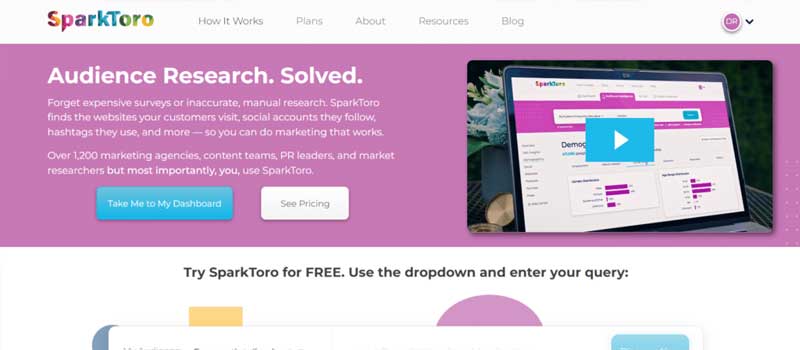
Stephen Houraghan
The reason that I went in search of you Rand and that’s exactly what I did.
I was like, get me Rand’s email address is because audience research it’s a big part of building a brand of being a brand strategist or a marketing strategist to really find that information that we can then use to connect the business with that customer that we’re going after.
I know that it really takes a lot of legwork out of the research that we do.
I’m wondering if you’d be able to kind of jump on and walk us through sparktoro from a strategist’s point of view or somebody who is trying to find this information for their clients so that they can then go on and build the brand for them.
Kind of talk us through what we can do with the tool and how we can use it, reports that we might be able to roll, and things like that
How Strategists And Agencies Use Sparktoro For Market Research

Stephen Houraghan
Tell us about howSparktoro is helping brand builders to enhance their research and what kind of results they seek?
Because you obviously speak to your customers all the time now what are they saying to you that they’re, finding most valuable about what they’re getting?

Rand Fishkin
The value of Sparktoro comes specifically from being able to accomplish one task or another.
So that task might be, Hey, I’m running a YouTube ad campaign in this particular sector. I need to optimize that ad campaign. I want you to show me. You know, words and phrases and hashtags that are popular.
I want you to show me demographics, and I want to see those YouTube channels across all these different audiences so that I can do better targeting on YouTube I can learn from the channels that are having success.
Wonderful. Yeah.
Then there are folks who are, who are creators, right? They’re content, marketers, content strategists and they are essentially writing blog posts and filming videos and sending tweets and posting updates on LinkedIn.
If they’re especially in B2B, that’s very big and what they’re trying to do is. Learn what resonates with their audience.
So they wanna see topics and hashtags, but they also wanna see which accounts are popular and go try and get amplification from those accounts and see what those accounts are doing.
That’s having so much success reaching the audience that they wanna reach. You can see a whole bunch of folks who use sparktoro specifically from what I’d call like brand intelligence.

That’s where the big bulk of our audience is. So for them, there’s an agency actually that I was just talking to that’s in the brand space a couple weeks ago.
What they really use Sparktoro for is to give an overall picture the competitive environment and how their client can stand out in a field, right?
So they might say, Hey. Your audience looks like this, right? So my audience follows the social account and they put in their client and then they’ll go and say, here’s your top five competitors, direct competitors and here’s your top five media competitors.
Like the people who are producing media in the space and sort of building audiences not necessarily competing against you on product.
Then they present that to the client and say, here’s how we think you can stand out in the space, be unique, have a positioning that is a unique value proposition compared to your competition.
Here’s places where they’re present, where you are not, and here are places where you can be present that they’re not present.
They’ll give some information on the sizing of spaces too. Right.
So they might say, gosh, you know, Whatever interior design, they might look across hashtags and phrases and say a lot more people are talking about mid-century design than are talking about Scandinavian design.
So, maybe that’s an opportunity actually, to lean on Scandinavian design as a unique value proposition or alternatively, maybe it’s a good opportunity for them to pick the bigger one.
Wanna Learn More About
Brand Strategy?
On-Demand Digital Program
Brand Master Secrets
Make the transition from hired-gun to highly valued brand strategist in less than 30 days. The systems, frameworks and tools inside this comprehensive program are all you need to level up.







